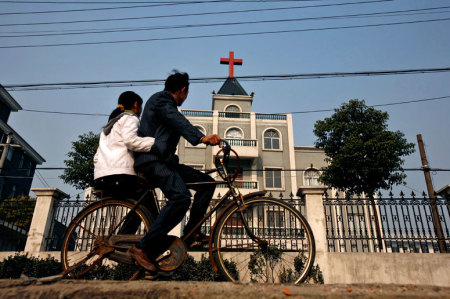Face and fingerprint scanning installed in churches as China increases surveillance

Hi-tech surveillance devices including face and fingerprint scanning equipment are now being installed in churches throughout China.
According to a report from Bitter Winter, a publication that explores human rights and religious freedom in China, a facial recognition system that was placed in a government-controlled church, called the Three-Self Church, in Urumqi — the capital of the Xinjiang Uyghur Autonomous Region — is now being introduced elsewhere in China.
"On October 6, Muyang Church (literally Shepherding Church) in the central province of Hubei, which is also the home of the Two Chinese Christian Councils of Huangshi city, had two biometric devices set up on its second floor. Since then, congregation members have to stand in line to have their faces and fingerprints scanned before being allowed to enter the church," the publication reported.
"Around the same time, in the city’s state-run Tian’en Church, facial recognition equipment has been also installed to check the believers who attend gatherings."
A Christian told the magazine several weeks ago that local authorities required every meeting venue established by Three-Self churches in Huangshi city to take the fingerprints of fellow believers and put on file their personal and family information.
The churchgoer was disturbed by the order since it requires not only that church members be under constant tracking and surveillance but that their families and relatives are implicated by association.
Other local believers also reported that since October, multiple state-sanctioned churches in Huangshi began using fingerprint sensors and face scanners to record their attendance at services.
"In late September, members of a Three-Self meeting venue in the Nanzhulin community in Huangshi had their fingerprints taken. The person in charge of the venue told them that all congregants have to have their fingerprints scanned to attend Sunday services," Bitter Winter noted.
“Just like employees punch in at work,” the person in charge of one church venue in the Nanzhulin community in Huangshi explained to a churchgoer. “In this way, the church can know clearly who attends the services and who doesn’t.”
Chinese Christians believe this is yet another example of the ever-increasing amassing of power by the government.
State surveillance of churches is not new in China. What is called the Sharp Eyes Project has long had a presence in state-run churches, with cameras placed even in washrooms of certain places of worship to ensure "comprehensive monitoring."
According to the South China Morning Post, the name of the surveillance program seems to stem from a Mao-era slogan aimed at urging people to denounce those who failed to follow Communist Party creed: “The people have sharp eyes.”
The surveillance program intends to cover all rural areas with the goal of achieving "blind-spot-free monitoring" by the year 2020, “covering all regions, sharing across all networks, available at all times, and controlled at all points.”
Earlier this year, reports emerged that state-run churches in Qingdao city in the eastern province of Shandong were ordered to stop singing songs from the Worship Songs or Spiritual Song Collection and were instead ordered to sing from a book of hymns approved by the state. The new approved songs only featured themes about loving the nation of China, celebrating birthdays and funerals, and respecting parents and the elderly.
“The hymns published by the government only promote political, secularized content. All believers are unwilling to sing them,” one director of a state-approved church told Bitter Winter in June, referencing the chorus of one of the hymns as an example: “China is beautiful; China is great; the sons and daughters of China love China. … Bless China, O Lord.”





















